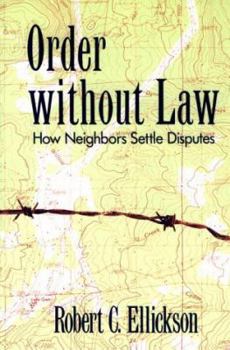Order Without Law: How Neighbors Settle Disputes
Select Format
Select Condition 
Book Overview
In Order without Law, Robert Ellickson shows that law is far less important than is generally thought. He demonstrates that people largely govern themselves by means of informal rules--social norms--that develop without the aid of a state or other central coordinator. Integrating the latest scholarship in law, economics, sociology, game theory, and anthropology, Ellickson investigates the uncharted world within which order is successfully...
Format:Paperback
Language:English
ISBN:0674641698
ISBN13:9780674641693
Release Date:March 1994
Publisher:Harvard University Press
Length:316 Pages
Weight:0.95 lbs.
Dimensions:0.8" x 6.1" x 9.2"
Customer Reviews
5 ratings
cool read
Published by Thriftbooks.com User , 22 years ago
Let me take these reviews down a level. This is a fantastic book for anyone who is interested in how order arises in social situations. As other people have noted, its a great piece of academic literature, but its also just plain interesting. Overall Mr. Ellickson is more than a little anti-government in his assessment of the need for state intervention. However, there are plenty of everyday occurences of order that are not backed up by law that make this interesting. Think of the fact that when a funeral procession drives down a street everyone stops to let them pass, even if the traffic light is against them. This book looks at how these kinds of events are established and why they persist. Very cool, I highly recommend it.
Good Fences Make Good Neighbors
Published by Thriftbooks.com User , 23 years ago
Order Without Law studies why, and under what circumstances, people accept a body of rules when there is no written law establishing those rules, and occasionally when the written law contradicts those rules. To answer this question, Professor Robert Ellickson settled into a long and detailed field study of the attitudes of cattle ranchers in Shasta County, California. His primary focus was on the informal rules governing boundary fences; who pays to build, who pays to maintain, who accepts the risk of stray cattle, and so forth. While his geographical focus was narrow, it was impressively deep, involving dozens of personal interviews and detailed reviews of public records. Ellickson explains why he believes that two current theories, law-and-economics and law-and-society, are both inadequate. He creates his own useful taxonomy of rules, rule makers, and rule enforcers. He offers hypotheses to predict future situations when people will more likely accept unwritten rules. Designed for professionals who deal daily in human behavior, such as sociologists, anthropologists, and lawyers, Order Without Law remains accessible to the general reader. One part was difficult to follow: the extended analysis of the Prisoner's Dilemma and its variations. But overall Order Without Law is a valuable addition to law and the social sciences.
Society and Law book that explains order without law.
Published by Thriftbooks.com User , 24 years ago
This book does not seek to explain the world in economic terms, but it does seek to explain it in sociological terms. Using the example of Shasta County cattle ranchers he has crafted an excellent book. It is scholarly, yet accessible.Ellickson brilliantly explains how some many of society's actions are coordinated by informal norms that do not necessarily mirror the law. The theory of how "order without law" occurs is what this effort seeks to explain. This is sometimes explained as spontaneous ordering. How ranchers in Shasta County settle their disputes without recourse to law has broad implications and allows Ellickson to construct a theoretical framework based on a society and law perspective.
Excellent interweaving of theory and empirics on ADR
Published by Thriftbooks.com User , 24 years ago
Ellickson lucidly combines economic theory with solid empirical work -- speaking both the language of game theory and the (folksy) language of Shasta County cattle ranchers -- to provide a fresh perspective on informal mechanisms of "alternative dispute resolution."Studies that combine social anthropology with microeconomic theory are rare; ones with nontrivial findings, and broad implications, are even rarer. But this is exactly what Ellickson accomplishes. Combining theory and observation, Ellickson cogently persuades us that while formal law always operates in the background of any conflict situation, the way people actually solve their disputes often differs markedly from formal law, because of culture, transaction costs, expectations, and other subtleties not incorporated into law books. This book is well-written, well-argued, and highly stimulating. It should be on the reading list of anyone interested in voluntary cooperation, organizational economics, cultural aspects of strategic behavior, or alternative dispute resolution.
Best of genre.
Published by Thriftbooks.com User , 26 years ago
Legal scholars tend to assume that law matters; i.e., that people seek to comport their behavior with applicable rules of law. In what is probably the best sociological study of the role of law in dispute resolution, Robert Ellickson demonstrates that disputes are often resolved without recourse to law and, even more important, in ways different than they would have been resolved in court. Ellickson begins with a richly detailed case study: Boundary and cattle trespass disputes in Shasta County, California. After reviewing the Shasta County experience, Ellickson relates his findings to a theoretical framework grounded in economics and psychology. The book thus combines the best of both theoretical and empirical approaches to the study of law. Legal scholarship is increasingly concerned with the way social norms control behavior. This is the book that started that debate. It deserves to be read by anybody who is interested in law, economics, or dispute resolution.






